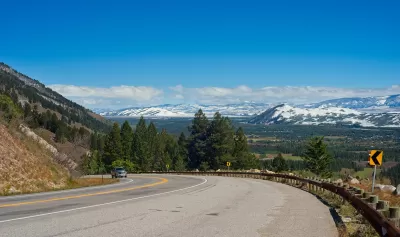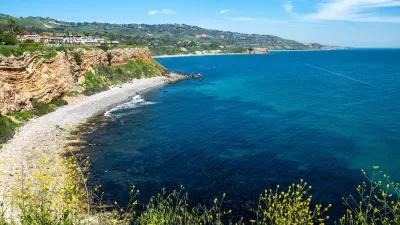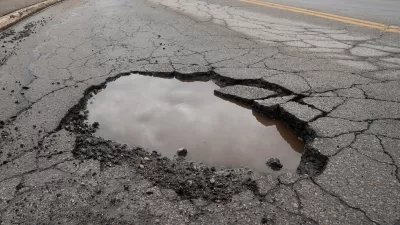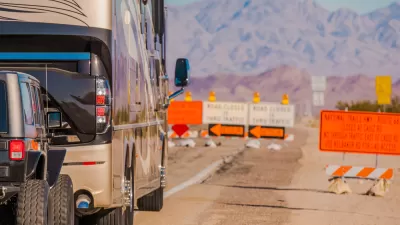Threats to aging transportation infrastructure are putting remote communities at risk of being cut off from essential services.

Mountain highways around the country are facing growing threats from landslides and erosion, putting some communities at risk of being stranded and making commutes dramatically longer for some.
Writing in High Country News, Christine Peterson points to the collapse of Wyoming Highway 22 in Teton Pass in early June, which forced residents to take a 200-mile detour to reach jobs and services. “And Teton Pass is far from the only mountain highway that Western working families depend on. As infrastructure ages and the climate changes, many of these essential routes are more vulnerable than ever.”
With more traffic traveling them every day and changes in weather creating wear and tear, many mountain highways are straining under pressures not foreseen when they were first built. “Historically, highways like Teton Pass could count on solidly frozen ground from December through March, but in recent years, more ground has been thawing earlier, then refreezing and thawing again.”
According to Peterson, any solutions are difficult — and expensive. “Spending millions of dollars to prevent a road collapse is also a tough sell with county and state officials, said Daniel Aldrich, director of the Security and Resilience Studies Program at Northeastern University in Boston. To officials focused on managing tight budgets and pleasing constituents, preventative projects just aren’t sexy.” Aldrich recommends building community resilience and ensuring that affordable housing exists near jobs, “making mountain road closures an inconvenience instead of a crisis.”
FULL STORY: When a landslide blocks your commute

Planetizen Federal Action Tracker
A weekly monitor of how Trump’s orders and actions are impacting planners and planning in America.

Congressman Proposes Bill to Rename DC Metro “Trump Train”
The Make Autorail Great Again Act would withhold federal funding to the system until the Washington Metropolitan Area Transit Authority (WMATA), rebrands as the Washington Metropolitan Authority for Greater Access (WMAGA).

The Simple Legislative Tool Transforming Vacant Downtowns
In California, Michigan and Georgia, an easy win is bringing dollars — and delight — back to city centers.

The States Losing Rural Delivery Rooms at an Alarming Pace
In some states, as few as 9% of rural hospitals still deliver babies. As a result, rising pre-term births, no adequate pre-term care and harrowing close calls are a growing reality.

The Small South Asian Republic Going all in on EVs
Thanks to one simple policy change less than five years ago, 65% of new cars in this Himalayan country are now electric.

DC Backpedals on Bike Lane Protection, Swaps Barriers for Paint
Citing aesthetic concerns, the city is removing the concrete barriers and flexposts that once separated Arizona Avenue cyclists from motor vehicles.
Urban Design for Planners 1: Software Tools
This six-course series explores essential urban design concepts using open source software and equips planners with the tools they need to participate fully in the urban design process.
Planning for Universal Design
Learn the tools for implementing Universal Design in planning regulations.
Smith Gee Studio
City of Charlotte
City of Camden Redevelopment Agency
City of Astoria
Transportation Research & Education Center (TREC) at Portland State University
US High Speed Rail Association
City of Camden Redevelopment Agency
Municipality of Princeton (NJ)





























